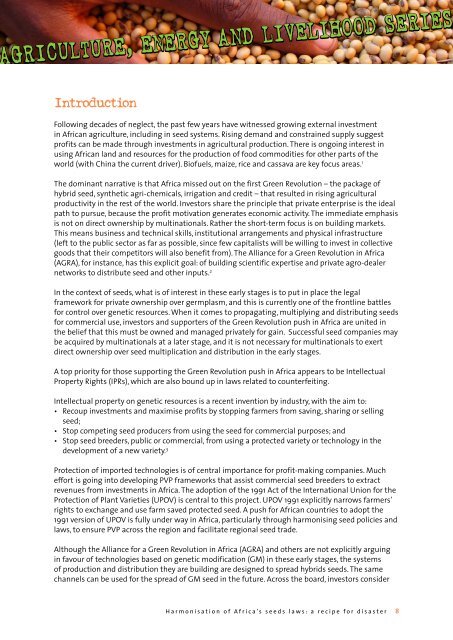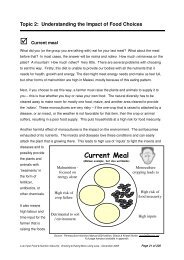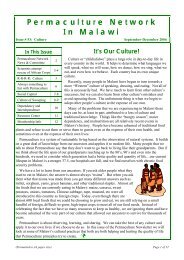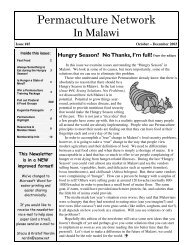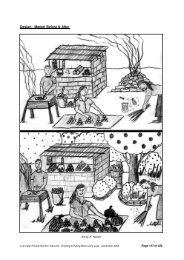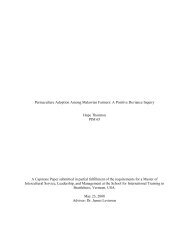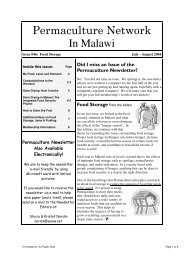Harmonisation of seed laws in Africa.indd - Never Ending Food
Harmonisation of seed laws in Africa.indd - Never Ending Food
Harmonisation of seed laws in Africa.indd - Never Ending Food
Create successful ePaper yourself
Turn your PDF publications into a flip-book with our unique Google optimized e-Paper software.
GRICULTURE, ENERGY AND LIVELIHOOD SERIES<br />
Introduction<br />
Follow<strong>in</strong>g decades <strong>of</strong> neglect, the past few years have witnessed grow<strong>in</strong>g external <strong>in</strong>vestment<br />
<strong>in</strong> <strong>Africa</strong>n agriculture, <strong>in</strong>clud<strong>in</strong>g <strong>in</strong> <strong>seed</strong> systems. Ris<strong>in</strong>g demand and constra<strong>in</strong>ed supply suggest<br />
pr<strong>of</strong>its can be made through <strong>in</strong>vestments <strong>in</strong> agricultural production. There is ongo<strong>in</strong>g <strong>in</strong>terest <strong>in</strong><br />
us<strong>in</strong>g <strong>Africa</strong>n land and resources for the production <strong>of</strong> food commodities for other parts <strong>of</strong> the<br />
world (with Ch<strong>in</strong>a the current driver). Bi<strong>of</strong>uels, maize, rice and cassava are key focus areas. 1<br />
The dom<strong>in</strong>ant narrative is that <strong>Africa</strong> missed out on the first Green Revolution – the package <strong>of</strong><br />
hybrid <strong>seed</strong>, synthetic agri-chemicals, irrigation and credit – that resulted <strong>in</strong> ris<strong>in</strong>g agricultural<br />
productivity <strong>in</strong> the rest <strong>of</strong> the world. Investors share the pr<strong>in</strong>ciple that private enterprise is the ideal<br />
path to pursue, because the pr<strong>of</strong>it motivation generates economic activity. The immediate emphasis<br />
is not on direct ownership by mult<strong>in</strong>ationals. Rather the short-term focus is on build<strong>in</strong>g markets.<br />
This means bus<strong>in</strong>ess and technical skills, <strong>in</strong>stitutional arrangements and physical <strong>in</strong>frastructure<br />
(left to the public sector as far as possible, s<strong>in</strong>ce few capitalists will be will<strong>in</strong>g to <strong>in</strong>vest <strong>in</strong> collective<br />
goods that their competitors will also benefit from). The Alliance for a Green Revolution <strong>in</strong> <strong>Africa</strong><br />
(AGRA), for <strong>in</strong>stance, has this explicit goal: <strong>of</strong> build<strong>in</strong>g scientific expertise and private agro-dealer<br />
networks to distribute <strong>seed</strong> and other <strong>in</strong>puts. 2<br />
In the context <strong>of</strong> <strong>seed</strong>s, what is <strong>of</strong> <strong>in</strong>terest <strong>in</strong> these early stages is to put <strong>in</strong> place the legal<br />
framework for private ownership over germplasm, and this is currently one <strong>of</strong> the frontl<strong>in</strong>e battles<br />
for control over genetic resources. When it comes to propagat<strong>in</strong>g, multiply<strong>in</strong>g and distribut<strong>in</strong>g <strong>seed</strong>s<br />
for commercial use, <strong>in</strong>vestors and supporters <strong>of</strong> the Green Revolution push <strong>in</strong> <strong>Africa</strong> are united <strong>in</strong><br />
the belief that this must be owned and managed privately for ga<strong>in</strong>. Successful <strong>seed</strong> companies may<br />
be acquired by mult<strong>in</strong>ationals at a later stage, and it is not necessary for mult<strong>in</strong>ationals to exert<br />
direct ownership over <strong>seed</strong> multiplication and distribution <strong>in</strong> the early stages.<br />
A top priority for those support<strong>in</strong>g the Green Revolution push <strong>in</strong> <strong>Africa</strong> appears to be Intellectual<br />
Property Rights (IPRs), which are also bound up <strong>in</strong> <strong>laws</strong> related to counterfeit<strong>in</strong>g.<br />
Intellectual property on genetic resources is a recent <strong>in</strong>vention by <strong>in</strong>dustry, with the aim to:<br />
• Recoup <strong>in</strong>vestments and maximise pr<strong>of</strong>its by stopp<strong>in</strong>g farmers from sav<strong>in</strong>g, shar<strong>in</strong>g or sell<strong>in</strong>g<br />
<strong>seed</strong>;<br />
• Stop compet<strong>in</strong>g <strong>seed</strong> producers from us<strong>in</strong>g the <strong>seed</strong> for commercial purposes; and<br />
• Stop <strong>seed</strong> breeders, public or commercial, from us<strong>in</strong>g a protected variety or technology <strong>in</strong> the<br />
development <strong>of</strong> a new variety. 3<br />
Protection <strong>of</strong> imported technologies is <strong>of</strong> central importance for pr<strong>of</strong>it-mak<strong>in</strong>g companies. Much<br />
effort is go<strong>in</strong>g <strong>in</strong>to develop<strong>in</strong>g PVP frameworks that assist commercial <strong>seed</strong> breeders to extract<br />
revenues from <strong>in</strong>vestments <strong>in</strong> <strong>Africa</strong>. The adoption <strong>of</strong> the 1991 Act <strong>of</strong> the International Union for the<br />
Protection <strong>of</strong> Plant Varieties (UPOV) is central to this project. UPOV 1991 explicitly narrows farmers’<br />
rights to exchange and use farm saved protected <strong>seed</strong>. A push for <strong>Africa</strong>n countries to adopt the<br />
1991 version <strong>of</strong> UPOV is fully under way <strong>in</strong> <strong>Africa</strong>, particularly through harmonis<strong>in</strong>g <strong>seed</strong> policies and<br />
<strong>laws</strong>, to ensure PVP across the region and facilitate regional <strong>seed</strong> trade.<br />
Although the Alliance for a Green Revolution <strong>in</strong> <strong>Africa</strong> (AGRA) and others are not explicitly argu<strong>in</strong>g<br />
<strong>in</strong> favour <strong>of</strong> technologies based on genetic modification (GM) <strong>in</strong> these early stages, the systems<br />
<strong>of</strong> production and distribution they are build<strong>in</strong>g are designed to spread hybrids <strong>seed</strong>s. The same<br />
channels can be used for the spread <strong>of</strong> GM <strong>seed</strong> <strong>in</strong> the future. Across the board, <strong>in</strong>vestors consider<br />
<strong>Harmonisation</strong> <strong>of</strong> <strong>Africa</strong>’s <strong>seed</strong>s <strong>laws</strong>: a recipe for disaster 8


